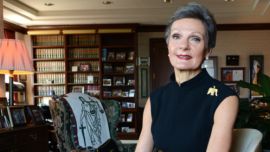Marwan Sarwar Gill is on a mission: he wants to correct a few misconceptions about Islam – and he’s travelled quite some way to do it.
Gill, 31, was born in Friedberg, near Frankfurt, and was raised in Germany before going on to study theology in the United Kingdom. After qualifying as an imam, or Islamic prayer leader, in 2017 he was asked to head up the Ahmadiyya Muslim Community in Argentina.
When he first arrived, he didn’t know how to speak Spanish, surviving “with just Google Translate,” he tells the Times during an interview at his organisation’s offices in the capital. But after improving his language skills with classes at the University of Buenos Aires (UBA), he is now travelling across the country, leading community outreach and humanitarian work.
Could you tell us more about the Muslim community here in Argentina?
In South America, Argentina is one of the countries with the largest Muslim population, along with Brazil. Most are in Buenos Aires and in the northern provinces. Many are from previous waves of migrations in the 19th and 20th centuries. Now they have children and grandchildren who identify themselves as Muslims. More recently, they mostly came because of work, many from northern African countries, Syria, and Lebanon. Some have relatives in Argentina from previous migrations, some also came as refugees from the recent crisis in Syria.
And yet, when I was sent to Argentina, there were no [Ahmadiyya] centres, communities, or any representatives. There is huge diversity and there are differences between the Muslim groups, like those in the Christian world. For example, obviously, you have the Catholic world, but you also have the Protestant and the evangelical churches. Similarly, as I represent a Muslim community, it is one community amongst more than 70 communities or groups.
In Argentina, or in general, the Muslim communities prefer to keep their circle as narrow or as close as possible. We are not like the Jewish community here in Buenos Aires, where the majority of them are in Once or Palermo. With Muslims, we are very spread out.
How do later generations connect with Islam? Do they still observe all the customs and religious traditions?
Argentina is a large country and the Muslims who came here failed to organise a Muslim community. Everyone started living their own life. Many times, they came and married non-Muslims. They can try to keep up their identity in the next generation, but it’s hard when the mother is not a Muslim.
The generation born and raised here in Argentina might see themselves as Muslims or children of Muslims, but they have difficulties living the Islamic faith. First of all, there’s also a language barrier. Second, even now, in Argentina, we have maybe five or six official mosques. There are very few Islamic schools or centres, so there isn’t really an Islamic environment to raise the children in.
When you first came here, you said there were no organisations. How did you build a community?
So I believe as a Muslim it was the invisible hand of God. I came here with a mission – not to build up a business company or to make money or invest money. I came here to conquer the heart of the people or to help them with the message of Islam, to give them the light of Islam …
For me, from the very first moment I arrived here, the invisible hand led me from one door to another door, be it by learning Spanish or crossing paths with different people. For example, one of the projects we offer is free Arabic and Islam classes. When we participated in one of the largest book fairs [in Argentina], many people came and asked if we offer any Arabic or Islam classes. I hadn’t thought of it. So we decided to put up a sign to subscribe or enroll in three Arabic classes. Then people started to come to Arabic classes and then they wanted to know how we pray. So, after class, I show them how we pray in Islam. Then people asked what are the requirements to be a part of our Muslim community. That’s how the community started building up.
Obviously, we as Muslims also believe in loving God through loving his creation. It’s a contradiction if you say I love God but you don’t love his creation, irrelevant of your faith, race, or ethnic background. So in this sense, we work a lot on humanitarian projects. For example, we have a toy drive each year for Christmas, although we don’t celebrate Christmas. We also go to different poor neighbourhoods, or ‘villas’ as you call them in Spanish, and we donate food. In Winter, we always donate blankets for the poor people and food items for the children. In the pandemic, we donated face masks to different hospitals. We have organised different football tournaments as we believe that sports are also important to reform the young teenagers, especially to keep them away from drugs, alcohol, and violence.
When you said people convert to Islam, how did they discover your organisation?
People are always really curious and they are looking because many people are disappointed by their own institutions of faith. I think something beautiful about Islam is that it is 100 percent horizontal, where everyone’s equal. For example, I’m an imam, [points] he’s a Muslim, she’s a Muslim, but I’m not above them. I’m not in this sense a source for connecting him with God – rather everyone has the same personal connection with God. We have the concept that each and everyone can speak directly to the boss. The boss doesn’t need a secretary! So I think that’s our special, unique characteristic.
I think differing from other Muslim groups, we [Ahmadiyyas] have a lot of focus on outreach. We don’t want to keep it as closed a circle. So we look out to reach non-Muslims, not with the goal of converting them to Islam because we believe that there should be no enforcement of religious matters … our task is not to necessarily increase the number of members of the community, but to increase the number of people who receive the true message of Islam.
Yesterday, for example, we went to a different city, La Plata, and we had a social experience. We had a banner: “I’m a Muslim, ask me anything.” Usually, when we hold this banner, people mostly asked about violence, terrorism, women’s issues, and especially there’s a lot of confusion between being a Muslim and being Arab. For example, it’s really hard for them to accept when I say I’m German because I have South Asian features. Sometimes they even ask, ‘So you’re from the country Musulmana?’ I would say, ‘No, Musulmana is not a country.’ They couldn’t understand being a German and a Muslim, or being Argentine and Muslim.
What do you think is the biggest misconception about Islam, especially in Argentina?
The violence and terrorism, believing that al-Qaeda or ISIS [Islamic State of Iraq and the Levant] are reflections of Islamic teachings. I think because many times the information you receive here, especially through the media, is from the United States or the West. I myself have witnessed it in the West, before and after the 9/11 [terrorist attacks].
Before 9/11, Islam was [seen as] similar to Hinduism and Buddhism. After 9/11, Islam was falsely portrayed …
How can I explain it? I don’t know. In the United States, there’s the KKK [Ku Klux Klan] and there are terrorist groups all around the world. It’s like someone asking Christians for justification for what they are doing … Sadly, when it comes to Islam, there is a lot of hypocrisy.




















Comments